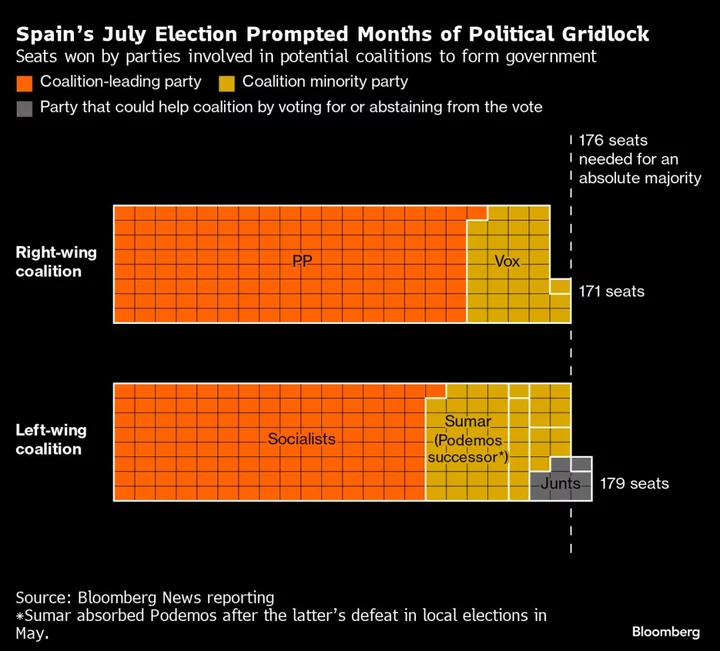Spain’s acting Prime Minister Pedro Sanchez reached an agreement with a Catalan separatist group to secure the votes he needs to form a third government, potentially ending months of gridlock in the euro region’s fourth-largest economy.
Sanchez’s Socialists struck a deal for Junts per Catalunya to grant broad political support to the premier’s election, the parties said Thursday. The political agreement is part of a broader negotiation to pass a controversial amnesty law for hundreds of activists and officials who faced penalties over their involvement in an illegal independence referendum in 2017.
With the support of seven lawmakers from Junts, Sanchez is poised to win a confidence vote with the backing of 178 lawmakers in the 350-member parliament in Madrid. Still, a vote will only be held once the amnesty law is agreed on and a bill is registered in parliament, which needs to be done before Nov. 27 or fresh elections will be called.
The two parties “confirm that the current political situation allows for an agreement to open a new opportunity to resolve the historic conflict around the political future of Catalonia,” they said. They agreed to negotiate taxation rules, Catalan financial autonomy and to allow Junts to propose holding an independence referendum.
The deal opens a complicated new chapter in Spanish politics with the 51-year-old premier reliant on a patchwork alliance of seven different parties to pass legislation. He’s also confronted with an angry opposition comprising the conservative People’s Party and the far-right group Vox.
Both are vehemently opposed to the amnesty, which will allow former Catalan President Carles Puigdemont to return to Spain six years after he tried to split the country. The PP won the most seats in July’s election but was unable to stitch together a governing coalition in a legislature still bitterly divided by the Catalan issue.
After years on the fringes of national politics and with Puigdemont living in self-imposed exile in Belgium, the Junts party was handed a chance to reshape the agenda when Sanchez and his more regular partners were left a handful of votes short of a majority.
Puigdemont personally led the talks with the Socialists from Brussels, dealing with a high-ranking party official from Sanchez’s party and a minister.
For Sanchez the deal represents another feat of political escapology.
He’s had to win the leadership of his party twice after being ousted by an internal revolt the first time around. He then seized power through the first successful no-confidence vote since Spain returned to democracy in 1978. He claimed his second term term in 2020 with a minority of 167 votes after 18 lawmakers abstained.
After his party was punished by voters in May’s local elections that appeared to signal the PP was set to return to power, Sanchez called a snap election and managed to deny the two right-wing parties a majority, paving the way for this week’s pact with Junts.
--With assistance from Jorge Valero.
(Updates with additional details throughout)

